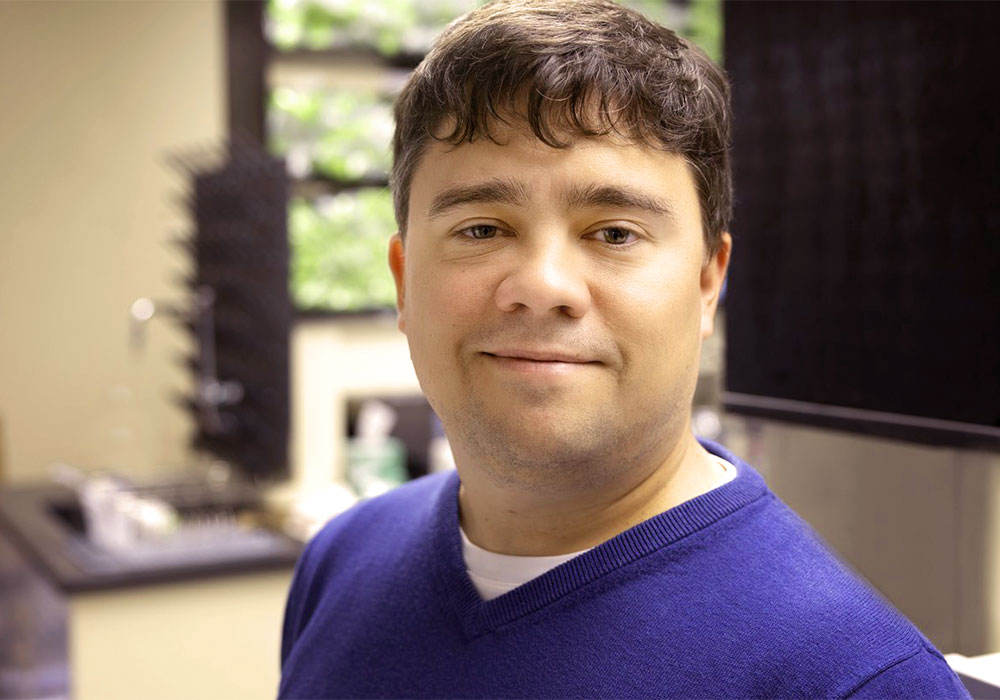New drug therapies being tested for treatment of schizophrenia hold potential for treating autism, says a School of Medicine Columbia faculty member who studies the brain receptors targeted by the experimental drugs.
Daniel Foster, who joined the Department of Pharmacology, Physiology and Neuroscience this past summer, is using a National Institutes of Health grant to study the relationship between repetitive behaviors and a particular brain receptor linked to such behaviors. Foster’s research suggests that muscarinic acetylcholine receptors could be a prime drug target to treat the habitual behaviors often seen in individuals on the autism spectrum.
"A previous clinical trial with Alzheimer’s disease patients looked at the cognitive benefits of targeting muscarinic receptors, and they surprisingly found that the 33 percent of Alzheimer’s patients who exhibited symptoms of hallucinations and outbursts experienced symptom relief while taking the drug,” Foster says. Gastrointestinal side effects eventually sidelined that experimental drug, but research on more selective muscarinic-targeted drug therapy continues.
“When you’re trying to think about moving a compound into clinical trials, it helps to know why a certain compound works.”
“We know that there is great potential with muscarinic receptors,” Foster says. “We just need to figure out how to dial those in without the side effects.”
Since joining the School of Medicine faculty, Foster has begun to collaborate with the Carolina Autism and Neurodevelopment Center as well as the NIH funded COBRE Center for Targeted Therapeutics. Collectively, this group includes faculty members from across the university engaged in drug discovery, autism, and autism-related research. Current treatment for individuals on the autism spectrum is largely behavioral therapy, especially targeted at early ages.
“It’s interesting to think about how a pharmacological therapy could fit in,” Foster says. “There are not a lot of studies on this, but could giving a drug targeting the muscarinic receptors prime the brain to respond better to behavioral therapy?”
Foster says positive outcomes from clinical trials of muscarinic-targeted drugs for schizophrenia could help to hasten similar testing with autistic individuals.
Disorders involving the central nervous system such as depression and schizophrenia are often difficult to treat pharmaceutically, Foster says, and the failure rate for such drugs in late-stage clinical trials is disproportionately high. Those high-cost failures have led many large pharmacology companies to scale back their R&D efforts in that field, which makes research efforts by academic neuroscientists increasingly important.
“When you’re trying to think about moving a compound into clinical trials, it helps to know why a certain compound works,” Foster says. “It’s not required, and some drugs make it all the way through testing without anyone really knowing how they work. But if you have research that explains the mechanism of action, that could increase the confidence that it could succeed in clinical trials.”
Foster became interested in neuroscience while he was a biochemistry undergraduate at Bucknell University. He completed his doctoral degree at the University of Michigan and a post-doctoral fellowship at the Warren Center for Neuroscience Drug Discovery at Vanderbilt University, where he learned more about neural circuits involved in behavior. His goal at the School of Medicine Columbia is to establish a neuroscience-based research group that targets specific receptors to potentially modulate those neural circuits.
“The focus of this university on expanding its neuroscience research was a real draw, along with the Carolina Autism Network that Jeff Twiss and Jane Roberts have set up and the COBRE Center for Therapeutics led by Igor Roninson” Foster says. “Integrating basic researchers with clinicians is actually more rare than people think.”
